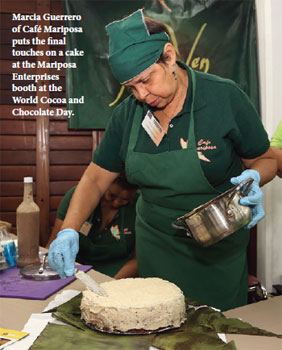

 Chocolate captures the hearts and imaginations of peoples all over the world. Its unique flavour, textural characteristics and more recently documented health and nutritional benefits combine and together make the secret of its success. Chocolate has the power to gladden mortal hearts. Chocolate captures the hearts and imaginations of peoples all over the world. Its unique flavour, textural characteristics and more recently documented health and nutritional benefits combine and together make the secret of its success. Chocolate has the power to gladden mortal hearts.
Chocolates made from our fine or flavour cocoa beans have earned us the enviable reputation as an exclusive producer of high quality fine or flavour cocoa beans. This reputation continues to be recognised by the International Cocoa Organisation, as Trinidad and Tobago is one of a handful of countries in the world with this status, and by chocolate producers who continue pay premium prices for our beans.
Trinidad and Tobago enjoys a healthy comparative advantage in cocoa production with its unique combination of rich cocoa history, suitable soils and climate, investment in intellectual capital by having the longest continuous cocoa breeding programme in the world, a one of a kind universal collection of unique cocoa varieties, high demand and premium prices.
 It seems paradoxical then that cocoa production in Trinidad and Tobago has fluctuated and declined continuously since a production peak in 1921 of over 35,000 metric tonnes, to a low of approximately 600 metric tonnes today. One of the main reasons for this can be traced back to the 1850s where the direction of the Trinidad and Tobago economy began to change away from an agrarian based economy with the discovery of oil in Trinidad, and the commercialization of the petroleum industry during the early 20th century. In a classic case of Dutch Disease, the Trinidad and Tobago economy continues to be energy based and the country derives most of its revenues from the energy sector. Real Gross Domestic Product and growth in GDP continue to be closely linked to fortunes of the energy sector. It seems paradoxical then that cocoa production in Trinidad and Tobago has fluctuated and declined continuously since a production peak in 1921 of over 35,000 metric tonnes, to a low of approximately 600 metric tonnes today. One of the main reasons for this can be traced back to the 1850s where the direction of the Trinidad and Tobago economy began to change away from an agrarian based economy with the discovery of oil in Trinidad, and the commercialization of the petroleum industry during the early 20th century. In a classic case of Dutch Disease, the Trinidad and Tobago economy continues to be energy based and the country derives most of its revenues from the energy sector. Real Gross Domestic Product and growth in GDP continue to be closely linked to fortunes of the energy sector.
The latest Ryder Scott Report (2013) stated that there was a 7% decline in proven natural gas reserves in 2013. These findings serve as timely warnings that there is an urgent need to diversify the Trinidad and Tobago economy away from non-renewable hydrocarbons to other more sustainable sources that can make a significant contribution to National GDP.
The Government of Trinidad and Tobago, has identified cocoa as a strategic crop to be developed because of its global potential and our comparative advantage as an exclusive producer of fine or flavour cocoa beans.
The industry currently faces numerous challenges and has been on the decline in the past few years. It has become financially unattractive for farmers and several have turned away from this industry as they are unable to make a reasonable living from the sale of the cocoa beans. The cocoa industry cannot develop sustainably with the current production of between 400-600 metric tonnes, so as a first step we need to increase cocoa production urgently.
We need to reorganise the industry to be more efficient and we need to explore value added opportunities once the production has been increased above a certain acceptable level to ensure this sub sector can be sustainably exploited. Our cheaper energy costs compared to other countries for chocolate making offer an immediate comparative advantage that should be tapped.


Dr. Darin A. Sukha is a Research Fellow/Food Technologist at the Cocoa Research Centre, UWI St. Augustine. |





